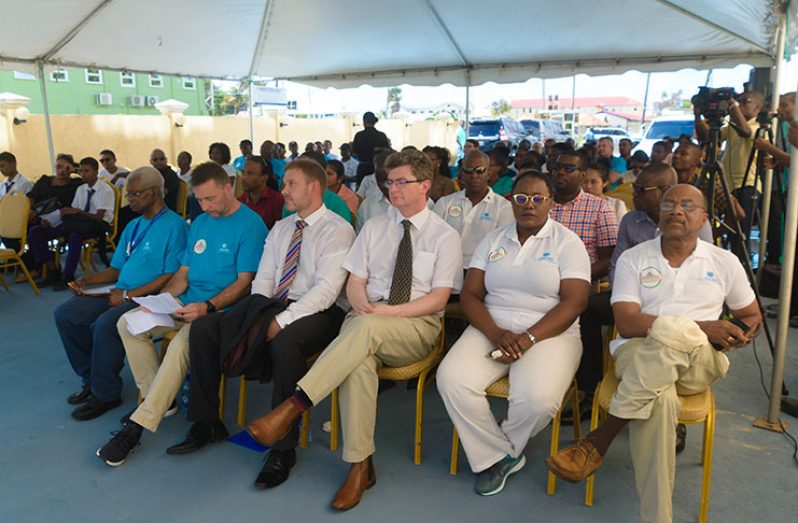…UK urges stronger partnerships in fighting graft
WHILE Guyana has been improving in the international perception corruption indices over the past three years, progress remains slow in this regard, British High Commissioner to Guyana Greg Quinn said Friday.
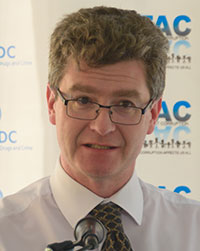
Quinn was at the time addressing participants at the State Assets Recovery Agency’s (SARA) Anti-corruption walk. The British envoy applauded Guyana for its efforts, but made it clear that much more work needs to be done. A country free of corruption, Quinn said, cannot be achieved in isolation as he stressed the need for strengthened partnerships among all stakeholders.
“Corruption matters because it corrodes the fabric of society. It undermines people’s trust in the systems of society and institutions of society; it is an obstacle to democracy and to the rule of law, it depletes national wealth and degrades the physical environment.”
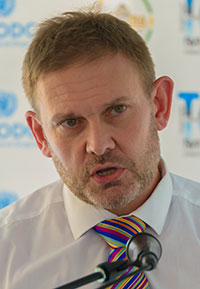
He reminded those present that while Guyana’s progress on the corruption perception indices reveals progress, it is not enough. In 2017, Guyana scored 38, making it the 91st out of the 180 countries, In 2016, the country scored 108 out of 176 and in 2015 it was 119 out of 167 with a score of 29.
“…so things are getting better but slowly. It is important to note that a score below 50 indicates problems with corruption, so let’s not think this is still not an issue.”
Quinn stressed that there can be no escape or impunity for those who are corrupt. “Regardless of where you are or who you are everyone must act within and be subject to the laws of the land. At the same time people, must also be free to highlight corruption and to see those who practise it be brought to boot.”
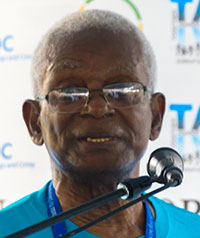
He noted too that in order for corruption to be highlighted, it is critical that people feel that they would be taken seriously and that action would be taken. As such, the British High Commissioner made it clear that proper reporting systems need to be put in place as well as systems to protect those who report wrongdoing.
“No one except those who practise it believes corruption is a good thing or is acceptable,” Quinn stated, while adding that by pointing out corruption, impunity for those involved would not exist. Themed, “Corruption is everybody’s business,” the anti-corruption walk which is part of a campaign saw several stakeholders participating in a walk which took place along Camp Street, Georgetown.
Similarly, Director of SARA, Professor Clive Thomas said, “You cannot sit back and expect me and SARA to be able to fight all the battles for you. You have to put a helping hand. The public has to be involved and institutions have to be involved.”
Professor Thomas noted that a synergetic approach is needed to tackle corruption here.
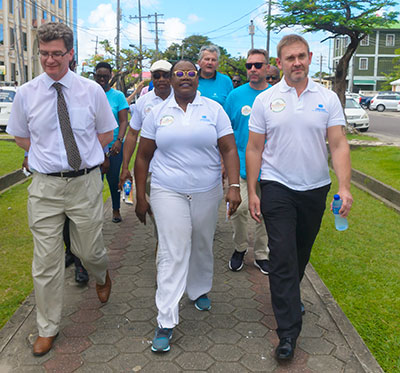
The sum of the whole is greater than its parts, he stated, while Guyana stands to benefit more through collaboration. Noting that SARA is only one year old, Professor Thomas said much has been achieved. “The institution is rooted in the fight against corruption and the recovery of stolen assets and we are driven by this, because we feel that poverty and the deprivation that existed in this country are absolutely intolerable given our national wealth,” he stated. SARA he said is not prepared to have those who have privileges of any sort, political, economic, and social to monopolise.
“The best way we can distinguish ourselves and show we are serious about the fight against corruption is by self-help,” stressing that Guyana has established an over-dependence on the international community. “What I find solace in, is the fight against corruption is an international fight. We can’t recover state property without fighting in the courts outside of Guyana.
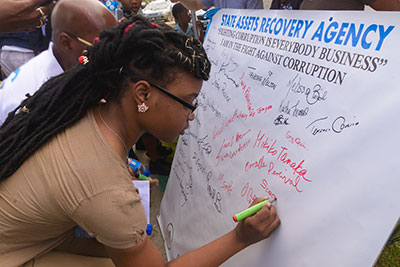
The fight is not a national fight, it is a global fight,” Professor Thomas stressed Friday before participants embarked on the anti-corruption walk. “Assets have left Guyana and have been deposited in accounts outside of Guyana and we have to find the means and support we need to get – to place the charges against the persons who hold Guyanese assets through unlawful conduct and try to recover it for Guyana. We can only do it with international help,” he continued.
Meanwhile, Dr Sam Sittlington, Irish financial investigations adviser to the Special Organised Crime Unit (SOCU), reminded participants that corruption has unfortunately become part of life, while noting that a country can have the best bribery and anti-corruption legislation in the world, but it would be ineffective “because they don’t take ownership of the problem”. The Irish expert noted that law enforcement officers are being equipped with the requisite tools to fight corruption here.
On Friday some 30 investigators completed a two-week bribery and anti-corruption training programme facilitated by the British government. “We need to plug the gaps in the legislation and make everyone accountable and let these officers do their jobs, because that’s what they want to do and that’s what they are being trained to do,” Dr Sittlington stated.
Similarly, David Robinson, Anti-Corruption adviser, United Nations Office on Drugs and Crime (UNODC) said it is important that all stakeholders work together to fight corruption. He reminded that corruption is stealing from the poor and that it undermines growth and prosperity.
“It is also important to recognise it has no name. It doesn’t belong to one person, people or political party. It is the responsibility of everyone to fix – we all have a part to play no matter how small that part may seem,” he stated. Robinson noted that Guyana became a signatory to the United Nations Convention on Corruption (UNCAC) in 2008 and while he said progress in implementing the Convention has been “a little slow,” the passage of the SARA legislation in 2017 represented “a major step in the right direction”.
“While there is significant work yet to be done…it is important that first steps are taken,” he said, noting that SARA has been the subject of grave misunderstanding and misrepresentations.
“It is important to acknowledge that many jurisdictions have recognised or are now recognising the importance of seizing unlawfully obtained assets. Guyana is not alone here in the Caribbean in creating a body such as SARA”, he said, pointing to Jamaica. Canada, USA, and Kenya have also been used as examples in this regard.
“SARA’s activity represents a further step along the road, the road towards a brighter future. Corruption and its highly damaging effects can be relegated to a footnote in Guyanese history – and Guyana’s incredibly rich natural resources can benefit everyone,” Robinson concluded.
Minister within the Ministry of Natural Resources, Simona Broomes, said her government is making good on its campaign promise to stamp out corruption. She said, “we have kept our works…we have a zero tolerance to corruption”. “None of us can say corruption is not deeply embedded in our country and our people,” she said, noting that efforts at eradicating the scourge rest not only with government, but with each individual. “I want to urge all Guyanese that corruption is something we should speak out against. We should all fight to have a country free of corruption,” Broomes stated, while noting that stamping out corruption will ensure Guyana obtains the respect it deserves.
Deputy Director SARA, ret’d Major Aubrey Heath-Retemyer, outlined the difference between SARA, and SOCU. He made it clear that SARA is concerned mainly with civil recovery. “We are not concerned with the length of sentence someone gets for his activity or her activity. We are simply concerned with the retrieval of state patrimony,” Heath- Retemyer stated. SOCU on the other hand he said, is responsible for ensuring that the criminal aspect of the matter is dealt with in accordance with the law.
Meanwhile, three students from the Skeldon Line Path Secondary School, in Berbice and the Abram Zuil Secondary on the Essequibo Coast received prizes for placing first, second and third respectively in SARA’s anti-corruption essay competition earlier this year.



.jpg)



